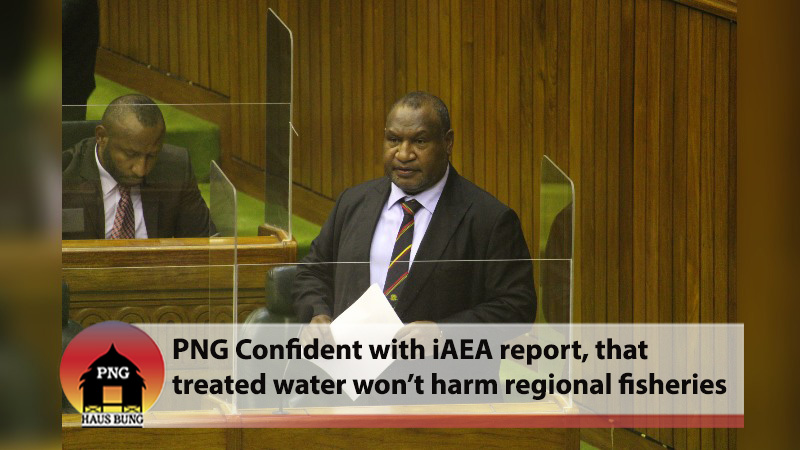Following the release of the International Atomic Energy Agency (iAEA) report and the independent analysis that it presents, Prime Minister, James Marape has extended Papua New Guinea’s consent for the controlled release of treated water from the power station that was destroyed by the tsunami that followed the 2011 Tohoku earthquake.
Minister for Fisheries & Marine Resources, Jelta Wong has confirmed that the National Fisheries Authority has also reviewed the international Atomic Energy Agency (iAEA) Review of Safety Related Aspects of Handling ALPS Treated Water at TEPCO’s Fukushima Daiichi Nuclear Power Station in Japan.
“Prime Minister and I have raised concerns with Japan’s Prime Minister, and other agencies, that the release of the water could harm regional fisheries so we sought independent analysis of scientific data,” Minister Wong said.
“Any discussion on nuclear material will always spark heated debate, so it is important that we approach the issue with caution and have full view of the facts.”
Minister Wong said the Government of Japan has taken our concerns seriously and promised Pacific island Nations that we will have the full technical information for our consideration.
“Papua New Guinea has taken a very cautious approach and initially opposed the release of the water without independent analysis of scientific data by third party laboratories.”
“The iAEA review has now provided the technical data that the Prime Minister and I have been waiting to receive.”
Wong added that from the information contained in the iAEA report, we have confidence that this treated water meets globally accepted standards and will not harm regional fisheries.
“As stated by the Prime Minister, PNG is satisfied with the technical information that has been released by the iAEA and the Government of Japan.”
“We agree that the controlled release can proceed so long as there is ongoing testing and independent analysis, and if there is any increase in risk, that further water release will be stopped immediately.”
Wong highlighted that the there will be a long an ongoing monitoring which will include additional analysis report on base line on environmental samples taken water around where the treated waters being release is being treated .
In the development of the report, the IAES oversaw the collection of the treated water samples taken from the Advanced Liquid Processing System treated water expected to be released and comparisons of the data from the samples taken of the treated water were undertaken by third –party laboratories that are members of the Analytical Laboratories for the Measurement of Environment Radioactivity (ALMERA).
“Testing of the treated water samples was done in laboratories in Switzerland, France, and United States of America as well as a laboratory in the Republic of Korea.”
Minister Wong confirmed that Papua New Guinea will continue to consult with partners, including other Pacific Island Nations and Japan as well as the IAEA on what is now a serious matter in the Pacific region.
“We are all custodians of the resources of our oceans and seas that are not only the source of our livelihoods but rather our home today and for our generations to come.”

